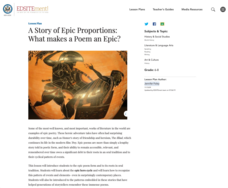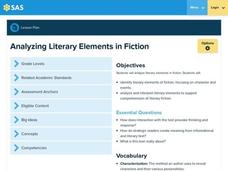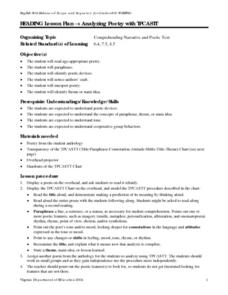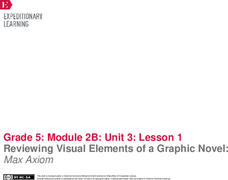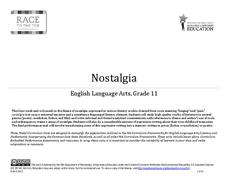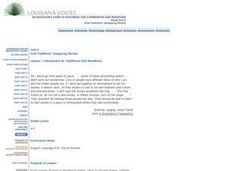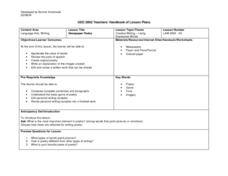Teaching Tolerance
Poetry and Storytelling Café
Academics take turns as actors in an engaging poetry cafe. Elementary learners work in small groups to create original poems or stories addressing community issues and read their work in front of a live audience. Scholars also reflect...
Curated OER
Writing
Young scholars write poems and a narrative story. In this writing lesson, students read stories and poems written by other young scholars and read examples of haiku's and diamonte's. Students write an acrostic poem and a...
National Endowment for the Humanities
A Story of Epic Proportions: What Makes a Poem an Epic?
Learners analyze the epic poem form and its roots in oral tradition. In this epic poetry lesson, students research the epic hero cycle and recognize the pattern of events and elements. Learners analyze the patterns embedded in the stories.
Curated OER
Teaching Selected Poems from Jim Wayne Miller's the Brier Poems
Students explore the basic elements of poetry through Appalachian life poetry. In this poetry lesson, students read seven poems from Jim Wayne Miller's the Brier Poems and complete poetry analysis activities for each poem.
Pennsylvania Department of Education
Analyzing Literary Elements in Fiction
Students analyze the characters and events in fictional writing. In this literary elements lesson, students study the meaning of the words characterization and fiction. They listen to the story Pigsty by Mark Teague, or any other book...
Curated OER
Lesson: Impressions
Here, Autumn Poplars is the painting upper graders will analyze. They look at techniques, time period, and the use of impressionism to convey a natural theme. They go outside to make observations of nature and use what they see to write...
Curated OER
Introducing Literary Elements in Fiction
Identify literary elements in fiction. In this reading comprehension lesson, learners read the book Pigsty and record literary elements onto a graphic organizer. They specifically discuss the main characters and events in the text.
Curated OER
Analyzing the Use of Irony in a Short Story
Ninth graders examine how literature connects to real-life and see how irony aids in the development of theme. They read Shirley Jackson's The Lottery, and discuss elements of foreshadowing and situational irony. Then learners will write...
Read Works
Hope Is the Thing with Feathers
One of Emily Dickinson's most poignant works is the focus of a poetry analysis activity. After reading "Hope Is the Thing with Feathers," individuals answer ten multiple-choice and short-answer questions about the elements found...
Curated OER
Analyzing Poetry with TPCASTT
Middle schoolers read a poem and complete a TPCASTT chart. They make a prediction about the title (T) , paraphrase each line (P), identify poetic devices and nuances (C-connotation), explore mood and tone (A-attitude), point out shifts...
Education Oasis
Creative Writing Unit: Analyzing, Interpreting, Discussing and Writing Various Genres of African-American Literature
A six-week unit takes high schoolers through various works of African-American literature, including poems, plays, and short stories. The lesson plan format includes a week-by-week description of activities, goals, materials, and...
Curated OER
Elements of Poetry
Prepare your learners to identify figurative language in poetry. Tips for reading poetry and what to look for are listed on these slides. Rhetorical devices are defined and plenty of examples are given.
Curated OER
Say Hi to Haibun Fun
Students examine the Japanese writing form of Haibun. They identify the elements of Japanese prose and poetry, analyze a haibun for writing devices, complete a graphic organizer, and compose an original haibun as a form of journal keeping.
Curated OER
What Makes a Novel a Novel?
They always say to write what you know. This approach is used to get middle schoolers prepared to write novels of their own. Using a favorite book as a model, potential novelists respond to prompts that ask about characters, plot, main...
Curated OER
Bringing Household Items to Life
Use folk tales as inspiration for learning about and using personification in creative writing. Learners brainstorm together in order to practice personification before writing their own poems or paragraphs about a household object.
EngageNY
Reviewing Visual Elements of a Graphic Novel: Max Axiom
Pass the tea! Using the resource, scholars participate in a Tea Party protocol to analyze text and images about inventions that helped meet societal demands. After sharing their observations with each other, they discuss visual elements...
Curated OER
Louisiana's Tragic Hero - "Evangeline"
"Ye who believe...List to a Tale of Love in Acadie." Longfellow's epic poem, "Evangeline," launches a study of tragic heroines, epic poetry, the expulsion of the Acadians from Canada, and their subsequent migration to Louisiana. The...
Massachusetts Department of Education
Nostalgia
To prepare for crafting their own memoir, class members examine poetry by Margaret Atwood, Billy Collins, Robert Hayden, and Claude McKay, stories by Richard Rodriquez and Willa Cather, and Barry Levinson's film Avalon. They examine...
Hawaiʻi State Department of Education
Poems That Dance
Combine the elements of dance with the actions in a poem. Learners review basic grammar, write an action-packed cinquain poem, and then choreograph a dance based on their cinquains. After the dances are done, they'll discuss the elements...
Curated OER
Introduction to Traditional Oral Narratives
Learners are introduced to the idea of traditional oral narratives and divide them into genres. They explore the genres of context, motifs and variants. Each student finds oral narratives in their own lives and practice retelling them in...
Curated OER
Newspaper Poetry
Students cut out nouns, verbs, adjectives, and adverbs from newspapers and create poems using words they have found.
Curated OER
Metaphor
High schoolers identify the distinction between literal and figurative language with a focus on metaphors. They complete a metaphor analysis chart, then practice expanding metaphors by composing their own comparisons of elements of the...
K20 LEARN
It’s Never Too Late to Apologize: Character Development and Theme in “The Scarlet Ibis”
Sometimes saying I'm sorry just doesn't cut it. Scholars examine a series of apology poems, songs, and stories and consider each speaker's regrets. Using what they have learned, they analyze James Hurst's short story, "The Scarlet Ibis,"...
Curated OER
Narrative Collage
Learners use a book or passage for their inspiration to create a narrative collage. They need to illustrate the action or the setting.




